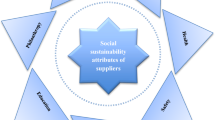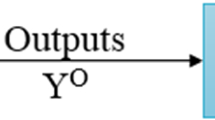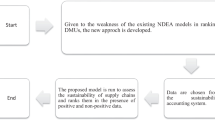Abstract
Evaluation of a supply chain is one of the most important measures for each organization. In the meantime, the simultaneous improvement approach of the economic, social and environmental performance in the field of supply chain management has attracted many researchers in recent decades. One of the suitable methods for this type of evaluation is the use of data envelopment analysis models. In the present article, the supply chain of Shoa Company has been evaluated on four levels: glass supply unit, profile supply unit, window manufacturing unit and installation unit. The company evaluation has been carried out for 18 different provinces of Iran and in total with 15 different economic, social and environmental criteria in two phases. In the first phase, the efficiency is obtained for each unit of the supply chain of the company separately based on the three aspects of sustainability, using the data envelopment analysis models; and, in the second phase, the efficiency obtained in the first phase was used as the new model ideals. The new model, which is a combination of the data envelopment analysis approach and the ideal planning, is the overall assessment of the company’s supply chain for the Shoa Co. based on sustainability criteria. The purpose of this study was to provide a comprehensive model for evaluating all parts of the supply chain of organizations with all aspects of sustainability.



Similar content being viewed by others
References
Ageron B, Gunasekaran A, Spalanzani A (2012) Sustainable supply management: an empirical study. Int J Prod Econ 140(1):168–182
Ahi P, Searcy C (2015) An analysis of metrics used to measure performance in green 1 and sustainable supply chains. J Clean Prod 86:360–377
Ahi P, Searcy C, Jaber MY (2016) Energy-related performance measures employed in sustainable supply chains: a bibliometric analysis. Sustain Prod Consum 7:1–15
Amindoust A, Ahmed S, Saghafinia A, Bahreininejad A (2012) Sustainable supplier selection: a ranking model based on fuzzy inference system. Appl Soft Comput 12(6):1668–1677
Azadi M, Farzipoor Saen R, Tavana M (2012) Supplier selection using chance-constrained data envelopment analysis with non-discretionary factors and stochastic data. Int J Ind Syst Eng 10(2):167–196
Azadi M, Jafarian M, Farzipoor Saen R, Mirhedayatian SM (2015) A new fuzzy DEA model for evaluation of efficiency and effectiveness of suppliers in sustainable supply chain management context. Comput Oper Res 54:274–285
Bai C, Sarkis J (2010) Integrating sustainability into supplier selection with grey system and rough set methodologies. Int J Prod Econ 124(1):252–264
Bal H, Orkcu HH, Celebioglu S (2010) Improving the discrimination power and weights dispersion in the data envelopment analysis. Comput Oper Res 37:99–107
Beamon BM (1999) Measuring supply chain performance. Int J Oper Prod Manag 19:275–292
Beamon BM (2005) Environmental and sustainability ethics in supply chain management. Sci Eng Ethics 11(2):221–234
Brandenburg M, Govindan K, Sarkis J, Seuring S (2014) Quantitative models for sustainable supply chain management: developments and directions. Eur J Oper Res 233:299–312
Carter CR, Rogers DS (2008) A framework of sustainable supply chain management: moving toward new theory. Int J Phys Distr Log 38:360–387
Charnes A, Cooper WW, Rhodes E (1978) Measuring the efficiency of decision making units. Eur J Oper Res 2(6):429–444
Dyllick T, Hockerts K (2002) Beyond the business case for corporate sustainability. Bus Strategy Environ 11(2):130–141
Erol I, Sencer S, Sari R (2011a) A new fuzzy multi-criteria framework for measuring sustainability performance of a supply chain. Ecol Econ 70:1088–1100
Erol I, Sencer S, Sari R (2011b) A new fuzzy multi-criteria framework for measuring sustainability performance of a supply chain. Ecol Econ 70(6):1088–1100
Eskandarpour M, Dejax P, Miemczyk J, Péton O (2015) Sustainable supply chain network design: an optimization-oriented review. Omega 54:11–32
Farzipoor Saen R (2008) Supplier selection by the new AR-IDEA model. Int J Adv Manuf Technol 39(11–12):1061–1070
Farzipoor Saen R (2009) A decision model for ranking suppliers in the presence of cardinal and ordinal data, weight restrictions, and nondiscretionary factors. Ann Oper Res 172(1):177–192
Ghoushchi SJ, Milan MD, Rezaee MJ (2018) Evaluation and selection of sustainable suppliers in supply chain using new GP-DEA model with imprecise data. J Ind Eng Int 14:1–13
Govindan K, Khodaverdi R, Jafarian A (2013) A fuzzy multi criteria approach for measuring sustainability performance of a supplier based on triple bottom line approach. J Clean Prod 47:345–354
Grosvold J, Hoejmose SU, Roehrich JK (2014) Squaring the circle: management, measurement and performance of sustainability in supply chains. Supply Chain Manag Int J 19:292–305
Gunasekaran A, Kobu B (2007) Performance measures and metrics in logistics and supply chain management: a review of recent literature (1995–2004) for research and applications. Int J Prod Res 45:2819–2840
Hassini A, Surti C, Searcy C (2012) A literature review and a case study of sustainable supply chains with a focus on metrics. Int J Prod Econ 140:69–82
Izadikhah M, Saen RF (2017) Assessing sustainability of supply chains by chance constrained two-stage DEA model in the presence of undesirable factors. Comput Oper Res 100:1–25
Ji X, Wu J, Zhu Q (2016) Eco-design of transportation in sustainable supply chain Management: A DEA-like method. Transp Res D Transp Environ 48:451–459
Jinfeng Y, Yu X, Thuhang T (2010) Selecting sourcing partners for a make-to-order supply chain. Omega 38(3–4):136–144
Khalili M, Camanho AS, Portela MCAS, Alirezaee MR (2010) The measurement of relative efficiency using data envelopment analysis with assurance regions that link inputs and outputs. Eur J Oper Res 203(3):761–770
Liang L, Yang F, Cook WD, Zhu J (2006) DEA models for supply chain efficiency evaluation. Ann Oper Res 145(1):35–49
Mahdiloo M, Saen RF, Lee K-H (2015) Technical, environmental and eco-efficiency measurement for supplier selection: an extension and application of data envelopment analysis. Int J Prod Econ 168:279–289
Marconi M, Marilungo E, Papetti A, Germani M (2017) Traceability as a means to investigate supply chain sustainability: the real case of a leather shoe supply chain. Int J Prod Res 55:6638–6652
Neely A, Adams C, Kennerley M (2002) The performance prism: the scorecard for measuring and managing business success. Financial Times/Prentice Hall, London
Parker C (2000) Performance management. J Available 49(2):56–70
Qorri A, Mujkić Z, Kraslawski A (2018) A conceptual framework for measuring sustainability performance of supply chains. J Clean Prod 189:570–584
Razmi J, Rafiei H (2010) An integrated analytic network process with mixed-integer non-linear programming to supplier selection and order allocation. Int J Adv Manuf Technol 49:1195–1208
Shepherd C, Günter H (2006) Measuring supply chain performance: current research and future directions. Int J Product Perform Manag 55:242–258
Varsei M, Soosay C, Fahimnia B, Sarkis J (2014) Framing sustainability performance of supply chains with multidimensional indicators. Supply Chain Manag Int J 19:242–257
Wen L, Xu L, Wang R (2013) Sustainable supplier evaluation based on intuitionistic fuzzy sets group decision methods. J Inf Comput Sci 10(10):3209–3220
Wong WP, Wong KY (2007) Supply chain performance measurement system using DEA modeling. Ind Manag Data Syst 107(3):361–381
Wong WP, Jaruphongsa W, Lee LH (2008) Supply chain performance measurement system: a Monte Carlo DEA-based approach. Int J Ind Syst Eng 3(2):162–188
Xing K, Qian W, Zaman AU (2016) Development of a cloud-based platform for footprint assessment in green supply chain management. J Clean Prod 139:191–203
Yu MM, Ting SC, Chen MC (2010) Evaluating the cross-efficiency of information sharing in supply chains. Expert Syst Appl 37(4):2891–2897
Zhu Q, Dou Y, Sarkis J (2010) A portfolio-based analysis for green supplier management using the analytical network process. Supply Chain Manag Int J 15:306–319
Author information
Authors and Affiliations
Corresponding author
Additional information
Publisher's Note
Springer Nature remains neutral with regard to jurisdictional claims in published maps and institutional affiliations.
Rights and permissions
About this article
Cite this article
Karimi, A., Jafarzadeh-Ghoushchi, S. & Mohtadi-Bonab, M.A. Presenting a new model for performance measurement of the sustainable supply chain of Shoa Panjereh Company in different provinces of Iran (case study). Int J Syst Assur Eng Manag 11, 140–154 (2020). https://doi.org/10.1007/s13198-019-00932-4
Received:
Revised:
Published:
Issue Date:
DOI: https://doi.org/10.1007/s13198-019-00932-4




